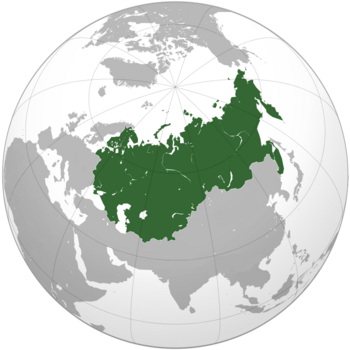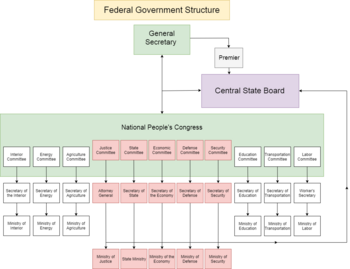Yångania
Yånganian Empire | |
|---|---|
|
Flag | |
| Motto: "Gjennom Friggs skjønnhet og Odins makt" ("Through Frigg's Beauty and Odin's power") | |
 | |
| Capital | Stockholm |
| Official languages | Swedish, Norwegian, Old Norse |
| Ethnic groups |
|
| Demonym(s) | Pavlovski |
| Government | Unitary One-Party Socialist Republic |
| Mikhail Gorbachad | |
• Premier | Nikolai Lermontod |
| Legislature | National People's Congress |
| Formation | |
• Crowning of Truvor | 862 |
• Establishment of Pavlov' | 880 |
• 1300 | Duchy of Chekhov |
• Tsardom of Pavlovsk | 1547 |
• Empire of Pavlovsk | 1721 |
• People's Federated Republic of Pavlovsk | 19 October 1917 |
| Population | |
• Estimate | 316,730,819 (3rd) |
| GDP (nominal) | estimate |
• Total | USD 1,925.67 Bn |
| Currency | Ruble (RUB) |
| Time zone | UTC +2 to +12 |
| Driving side | right |
| Calling code | +669 |
Pavlovsk, officially the Federated People's Republic of Pavlovsk (Pavlovski: Федеративная Народная Республика Па́вловск Romanization: Federativnaya Narodnaya Respublika Pávlovsk), is a transcontinental country spanning Eastern Europe and Northern Asia. From north-west to south-east, the nation is directly bordered by Sundsvall, Lubilia, Carpathia, Oghuz, Samarra, the Afghan Republic, the Persian Sultanate, the Steppe Confederacy, Turan, Songjiang, and the Joseon Empire. It shares maritime borders with Japan at the Tartar Strait, and with the Niagara Union at the Bering Strait. Pavlovsk is the largest country in the world by area, covering over one-eighth the world's inhabited land area, and spanning eleven time zones.
Politics
The constitution of Pavlovsk states that the Federated People's Republic of Pavlovsk is "a united socialist state under the leadership of the working class and based on the alliance of workers", and that the state will "apply the principles of communism as it sees fit." Historically, different eras of leadership have implemented the "principles of communism" in vastly different ways. Its current political, ideological and economic system is that of "Rykovian Socialism", which has been termed by its advocates as "reformed socialism", "socialism with democratic characteristics", a "socialist market economy", and a "market economy which pursues communist ideals".
Communist Party
The Constitution of Pavlovsk designates the Communist Party of Pavlovsk (CPP) as the ruling party of Pavlovsk. The party has a pyramidal structure, with the highest authority over the state and government being vested in the General Secretary. The General Secretary is indirectly elected by National People's Congress every five years, and can be removed from office at any other time by the National People's Congress via a unanimous vote. The National People's Congress is made up of 250 representatives who are indirectly elected by the Worker's Councils of the nine Federal Republics. The Worker's Councils are directly elected by the citizens of their respective Federal Republics.
Government
The National People's Congress is main governing body of the Federal government of Pavlovsk. As a collective body, the National People's Congress serves as an overseer of the General Secretary's office, and can override policies made by the General Secretary via unanimous vote. The Congress' more concrete powers come from it's 11 individual committees, each of which dictates the policy of a Federal Ministry. All Congress members are apart of at least one committee, but some are apart of multiple. The majority of Congress members' time is spent within these specialized committees.
The 12 Congressional committees reside over their 11 respective Ministries: Agriculture, Economy, Defense, Education, Energy, Justice, Labor, State, Interior, Transportation, and Security. The Ministries of Economy, Defense, State, Security, and Justice are considered the "top five" ministries, and have significant authority of the way the nation is run. Each Ministry is headed by a committee-appointed Secretary, who are directed by the Constitution to "accurately and concisely carry out policies dictated by their Ministry's committee."
The General Secretary is the de jure head of state, elected by the National People's Congress. The Premier is appointed by the General Secretary and approved by the National People's Congress, and serves the head of government. The General Secretary also presides over the Central State Board, which is composed of the Premier, and the Secretaries of the top Ministries. Committee leaders also frequently sit in on Central State Board meetings. The incumbent General Secretary is Mikhail Gorbachad. The incumbent Premier is Nikolai Lermontod.
Since Mikhail Gorbachad took office in 1985, there have been some moves toward political liberalization within Pavlovsk, in that open contested mayoral and council elections are now held at the town and city levels, with little to no party oversight. However, the party retains effective control over higher government appointments, as candidates for election in the Worker's Councils must be approved by the party. However, requirements for party approval have been eased significantly since 1985.
Foreign relations
History
See Also: Timeline of Pavlovski History
Geography
Climate
Environment
Economy
Energy
Industry
Infrastructure
Transport
Demographics
Education
Religion
Culture
Music and art
Cuisine
Sports
This article is from APSIA 1.2. For the most recent iteration of APSIA, look at Category:APSIA 2.B |


